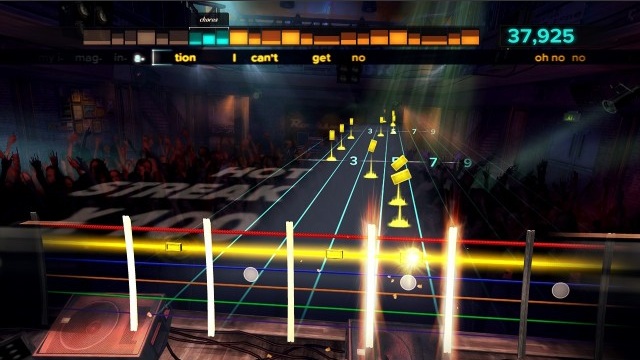The evolution of the guitar game.
Rocksmith is the game that Rock Band 3's Pro Guitar mode wanted to be. As an expert of all things plastic guitar, I was ready to take that one step on the road of learning the real thing, but the bona fide Pro guitar didn't launch until March of this year and the game itself didn't teach players how to tune and care for the instrument. Rocksmith's entire concept, however, is to respect the guitar, not solely as a peripheral, and to guide players with the proper techniques and teaching methods. This is a "serious game" for the masses if there ever was one.
While Rocksmith isn't the first rhythm title to be compatible with a real-life instrument, it is the first that comes with an 11.25-inch 1/4"-to-USB propriety cable, called the Rocksmith Real Tone Cable, that turns practically any working guitar into a working controller for the game. With the cable turning an analog sound into a digital format, players can borrow their dad's you-better-not-touch-that five-string wonder for Rocksmith. Even an acoustic guitar can be used with the assistance of a pickup at a local music store.
Not only does the cable allow musicians to record music directly onto their computer at 48 kHz, but the addition of a second cable ($29.99) opens the option for simultaneous split-screen cooperative play for the game. That said, Rocksmith will cost $79.99 with the cable, while the full $199.99 also comes packed with an Eiphone Les Paul Junior guitar that is more than serviceable for newbies, myself included.
Just to dive headfirst into how the game works, it's essentially a more complex version of the familiar note-feeding track in Guitar Hero and Rock Band. After going through an easy tuning check-up, capsules fall along a track and the players must hold down their finger on the right fret of the correct string and pluck the string the moment the capsule hits the fingerboard overlay on the screen. To make it easier, the interface shows the odd fret numbers (1, 3, 5, 7, etc.) so that players can match their fingers easily to where it needs to go on the provided Eiphone Les Paul. But let's be clear here: The capsules represent the actual notes of the song. If a player scores 100,000 points (essentially 100%), that person has effectively played the actual song in its entirety. Time to make some tips.

Of course, that alone doesn't set Rocksmith apart from the pack, so in an innovative redesign, the difficulty of the notes along the track are completely variable. Hitting all the notes in a section increases the complexity of the notes, while missing a few decreases it. Though players have the option of whether to start a song on the lowest or highest difficulty setting by default, the level of challenge always shifts to the player's ability. Moreover, upon completing a song, the game will recommend further songs at the player's level as well as lessons that specifically target the player's trouble spots. Whether it's a chord transition, palm mute, bend, or trembolo, each technique has an in-depth tutorial with videos, images, and tests.
If straight and narrow lessons ever become too tedious, players can mix it up with mini-games which mostly disguise the fact that they are meant to improve their basic skills. In particular, Ducks has players shooting ducks (oh, really) that fly up on the screen and can be shot for points by holding down the string at the right spot and plucking. Swiftness and accuracy all award more points, all while improving the player's muscle memory so that there's less need to look down at the string to play the right note.
Rocksmith brings the authentic guitar experience to Xbox 360, PS3, and PC on October 18th.







